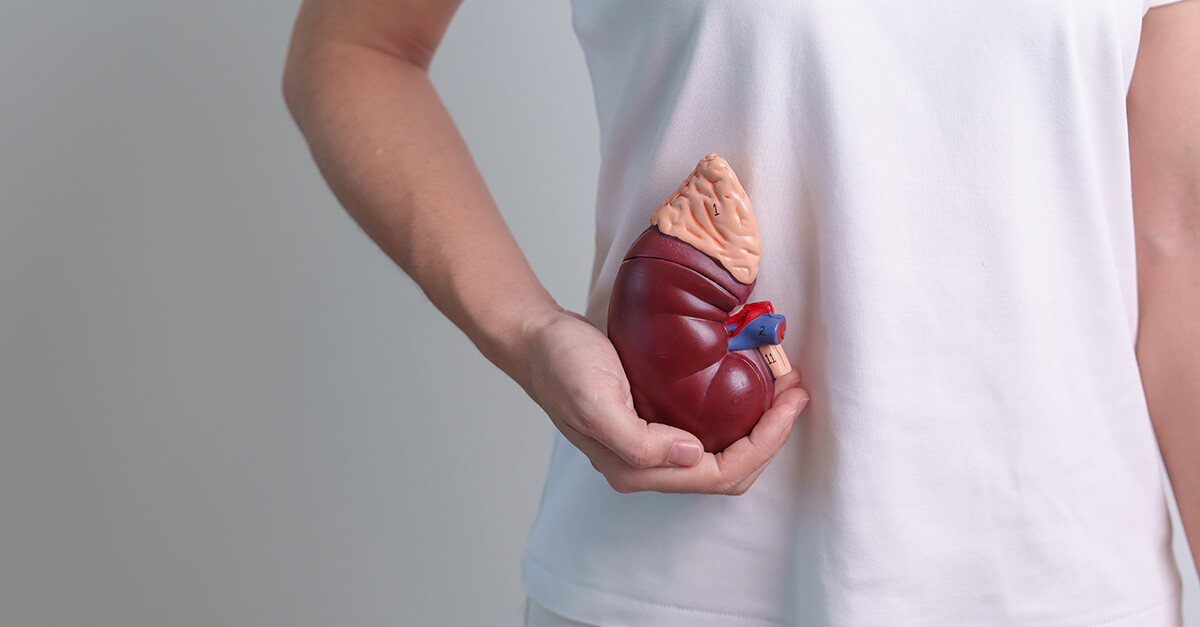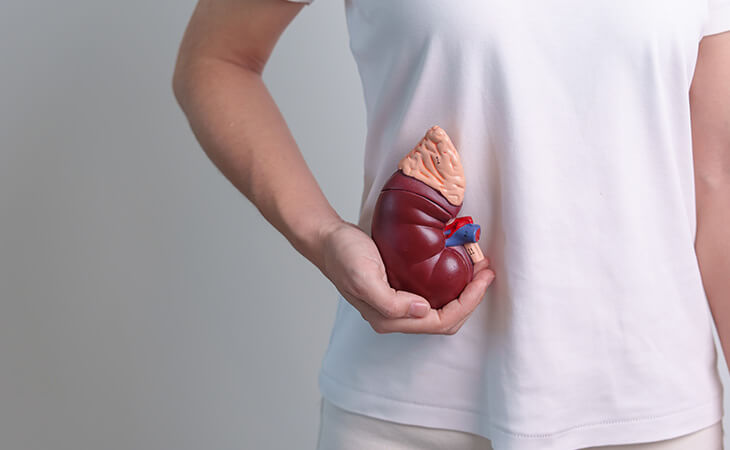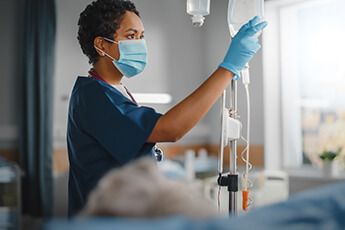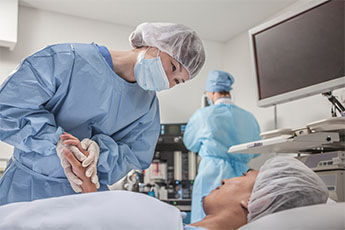Can you live with one kidney? Life expectancy and what to expect


Living with a single kidney doesn't usually reduce life expectancy, and individuals with one kidney are able to live normal, healthy lives.
Sometimes, people without kidney problems choose to donate one of their two healthy kidneys to a loved one or another person in need of a kidney transplant. And occasionally, people are born with only a single working kidney. This condition is known as congenital solitary kidney.
In most cases, having a single kidney doesn't affect survival rate. However, some underlying medical conditions that may require kidney removal, including kidney cancer, cystic kidneys, or polycystic kidney disease, can reduce survival.
For anyone living with one kidney, preserving kidney function is an important priority. Therefore, it's wise to do everything possible to keep your kidney healthy, including eating a healthy diet and visiting your doctor regularly for check-ups.
In this guide, you'll learn about the different ways that living with a single kidney can influence lifespan, what to expect after kidney surgery, side effects of kidney removal, common dietary recommendations, and more, with stories from real patients.
In the Inspire Kidney Cancer Survivors Community, members share their personal experiences of living with kidney cancer or related cancers and how to find support. This content should not be used as a substitute for professional medical advice, diagnosis, or treatment. As always, consult with your doctor before trying any new treatments or medications.
Does having one kidney affect life expectancy?
According to the National Kidney Foundation, one healthy kidney can work as well as two. On the other hand, conditions like kidney cancer and polycystic kidney disease — common reasons for kidney removal — are associated with lower survival rates. However, this is not necessarily due to kidney removal surgery.
Kidney cancer nephrectomy and survival
In patients with kidney cancer, partial or full nephrectomy surgery is sometimes used as a way to stop the cancer from spreading. The goal of these surgeries is to improve patient survival rates.
According to a 2020 study of over 1,600 patients with renal cell carcinoma (RCC), the most common type of kidney cancer, survival following nephrectomy depended on the stage of the cancer (a measure of how far the cancer has spread).
Five-year survival rates after kidney removal were as follows:
97.4% in stage I RCC patients
89.9% in stage II RCC patients
77.9% in stage III RCC patients
26.7% in stage IV RCC patients
The sooner RCC or other types of kidney cancer are detected and treated — using kidney removal surgery, chemotherapy, radiation, or other treatment methods — the higher the survival rates for patients tend to be.
A nephrectomy is a major surgery that removes some or all tissue from a patient's kidney. Learn what to expect following nephrectomy surgery for kidney cancer.
ADPKD kidney removal and survival
Autosomal dominant polycystic kidney disease (ADPKD), the most common genetic cause of polycystic kidneys, results in the formation of kidney cysts and enlarged kidneys. Some patients develop hundreds of cysts. As a result of these cysts, kidney function is impaired, and sometimes partial or full nephrectomy is required.
On average, patients with ADPKD are likely to experience kidney failure, also called end-stage renal disease (ESRD), by the fifth or sixth decade of life. Kidney failure requires dialysis and is associated with low survival rates. But kidney failure is not inevitable, and managing cystic kidney disease can prolong patients' lifespans.
Approximately 20% of ADPKD patients require nephrectomy (kidney removal). In most cases, this is due to cyst growth and kidney enlargement. When kidney removal is performed in ADPKD patients, the purpose of the surgery is to improve kidney function, decrease symptoms, and prolong survival.
When kidney cysts need to be removed because they're interfering with kidney function or causing other complications, there are several different methods available. Less-invasive methods use high-tech surgical instruments to drain or remove cysts with less trauma. Other methods include open surgery and partial or full kidney removal. Learn more about kidney cyst removal.
Kidney donation and life expectancy
Current evidence suggests that donating one of your kidneys to someone in need doesn't decrease your life expectancy. In fact, one study found higher survival rates in kidney donors compared to the general population — however, this was likely because only healthy people are allowed to donate kidneys.
Congenital solitary kidney and life expectancy
Congenital solitary kidney refers to a group of related conditions that result in a person being born with only one kidney (also called renal agenesis) or with two kidneys, only one of which works (known as renal aplasia or dysplasia).
In patients born with one working kidney or who had a kidney removed in childhood, lifespan is almost identical to patients who go through childhood with two working kidneys.
These patients may be at a slightly increased risk of kidney damage or high blood pressure later in life, but generally experience excellent survival if they maintain kidney health as follows:
maintaining a healthy weight
not consuming excessive amounts of alcohol
not smoking
avoiding contact sports that could cause kidney damage
In contrast, some patients are born with a congenital solitary kidney and other abnormalities in their existing kidney or elsewhere in the urinary tract. For these patients, the risks of high blood pressure and reduced kidney function occurring are significantly higher, and overall survival is lower.
What should you expect after losing a kidney?
Kidney removal is a serious surgery that is performed in a hospital. If you need to undergo a nephrectomy procedure, your doctors will monitor your recovery for several days or longer at the hospital, then discharge you once you're ready to go home.
During the recovery period following surgery, you'll be provided with recommendations to prevent injury and allow your body to heal, which may include the following:
not lifting objects that weigh more than 10 pounds
avoiding strenuous physical activity, including exercise, that makes you strain or breathe hard
keeping the incision area clean and dry to prevent infection
changing bandages regularly
avoiding soaking in tubs
With approval from your doctor, you may be able to do certain light movements or activities during recovery, such as the following:
getting up and moving around to relieve pain or encourage bowel movements
going on short walks
using stairs if needed
light housework chores
You can safely speed up your recovery by eating a healthy diet, doing light activity as recommended by a doctor or physical therapist, and getting plenty of rest and sleep.
What are the side effects of having one kidney?
Most people who have a kidney removed can adapt very well to life with one kidney. Living with a single kidney doesn't tend to cause many problems. It's normal for the remaining kidney to grow larger, which allows it to compensate and increase functioning.
In the majority of cases, patients do not experience long-term complications or other issues after kidney removal. However, immediately following the surgery, patients may experience these short-term symptoms:
pain in the abdomen or on the flank where the kidney was removed
bruising, swelling, or redness around the surgery area
shoulder pain following a laparoscopic procedure (radiating nerve pain caused by abdominal pressure due to carbon dioxide gas used during the surgery)
constipation from prescribed pain medications
intermittent nausea
All of the above symptoms are normal after kidney removal surgery and usually get better with time.
However, if you experience any of the below issues after a nephrectomy procedure, contact your healthcare team immediately:
body temperature above 100.5°F (38°C)
surgical wounds that are bleeding, red or warm to the touch, or have a thick, yellow, green, or milky drainage
abdominal swelling
severe pain or pain that doesn't improve with the use of pain medication
nausea or vomiting lasting longer than 24 hours
difficulty breathing
a cough that doesn't go away
an inability to eat or drink
difficulty or inability to urinate
These symptoms may indicate a serious problem that requires further medical attention.
What foods should you avoid with one kidney?
Doctors sometimes advise patients who are living with one kidney to make certain dietary changes to help preserve kidney function. You may need to reduce your intake of protein, sodium, phosphorus, and potassium, all of which can tax the kidney.
Your doctor or a dietitian can help you make the necessary dietary adjustments to preserve your kidney function and still receive adequate nutrition.
Also, some foods may increase the risk or recurrence of kidney cancer. If you've received a diagnosis of kidney cancer, it may be wise to limit or avoid foods that are associated with renal cancer, including processed foods, sugary foods, starches, simple carbohydrates, charred or burnt meat, and processed meat products.
Kidney removal (nephrectomy) is a treatment that's sometimes used for kidney cancer and other types of kidney disease. When patients undergo a partial or full nephrectomy, doctors may advise dietary changes before or after the surgery. Learn more about the relationship between diet and kidney removal.
Can you drink alcohol with only one kidney?
The evidence on alcohol consumption and kidney function is mixed. In people with two working kidneys, moderate drinking may not be associated with kidney problems. However, excessive alcohol use can raise blood pressure and cause other kidney issues, including kidney damage and kidney disease.
For people with one kidney, limiting alcohol consumption or avoiding drinking altogether may be wise. If you have a single kidney and drink too much, you are more likely to experience kidney failure due to kidney damage. If you're considering whether or not to drink alcohol with one kidney, ask your doctor for advice.
Also, people with kidney cancer or polycystic kidney disease often have impaired kidney function. Alcohol consumption may be a risk factor for kidney cancer, and excessive drinking could worsen kidney function in polycystic kidney disease.
If you have kidney cancer, your kidney function may be impaired due to tumors, kidney removal, or other cancer treatments. In these cases, doctors usually recommend certain dietary changes to help prevent kidney failure. Learn about diet, nutrition, and kidney cancer.
What should you eat after kidney removal?
Current guidelines suggest that you can go back to eating a normal diet after a nephrectomy or other kidney surgery unless advised differently by your physician. The guidelines also recommend drinking four to eight glasses of water per day during recovery unless you're instructed to do otherwise.
If you experience an upset stomach or indigestion, you may benefit from eating soft, bland, low-fat foods such as plain rice, baked or broiled chicken, toast, and yogurt.
And if you experience irregular bowel movements, be sure to avoid straining. Using a daily fiber supplement may help with bowel regularity.
If you experience constipation for more than one to two days, you may ask your doctor about using a gentle laxative to aid bowel movements.
Dietary changes to preserve kidney function after a nephrectomy
After the recovery period, evidence indicates that certain dietary changes may help maintain kidney function in kidney cancer patients, as well as in other patients who are living with one kidney following kidney removal.
Adjusting your diet after a nephrectomy to achieve a better outcome and support kidney health requires permanent, lifelong changes to help prevent kidney failure or avoid the recurrence of kidney cancer.
According to studies, foods and dietary habits that may support kidney function and decrease the risk of kidney cancer include the following:
vegetables (especially cruciferous vegetables like broccoli), fruits, and other plant-based foods that contain flavonoids (antioxidants), including natural spices and culinary herbs
foods that are high in omega-3 fats, including wild-caught seafood
other healthy fats, such as olive oil
foods that are high in micronutrients (vitamins and minerals), and particularly foods rich in vitamin C, like green peppers and citrus fruits
Studies also indicate that eating a balanced diet rich in fruits, vegetables, fiber, and healthy fats can improve survival in cancer patients.
Finally, a study of over 1,200 chronic kidney disease (CKD) patients found that on average, 1 to 2 liters of water per day (approximately 32 to 64 ounces) was most effective for preserving renal function. Consuming too little or too much water was associated with impaired kidney function.
If you aren't sure how much water to consume each day, your doctor can discuss the best strategy to stay hydrated without taxing your kidney.
Living with one kidney: Patient stories
Most patients recover relatively quickly from pain, but it's possible to experience lasting pain after a nephrectomy:
“My husband had quite a large tumor attached to his kidney. Margins were clear and all scans since that have been clear. He is still suffering from sore and sometimes swollen testicles a year later. It's over a year since surgery so it's getting difficult to deal with at this stage.” Go to post
“My boyfriend experienced soreness and swelling for quite a while after his kidney was removed. He found that an anti-inflammatory helped him 100%. You could ask your doctor for a prescription.” Go to post
Nausea is relatively common after kidney removal:
“I am 3 weeks post radical nephrectomy and am having severe bouts of nausea. I went to my doctor who tested to ensure that I wasn't anemic and also prescribed Zofran - which helps some, but more like keeping things at bay rather than getting rid of the nausea.” Go to post
“Three months after a laparoscopic radical nephrectomy, I am STILL experiencing daily problems with nausea in the morning, ringing in my ears, and dizziness. I keep relaying this information to my internist and he says, ‘You’ve been through a lot.’” Go to post
Some patients experience blood pressure changes and other kidney function issues following a nephrectomy procedure:
“My nephrectomy was about a year ago. My internist warned me that I would experience BP fluctuations. My BP would go high and then very low. I was too weak to drive most of the time. I also had buzzing in my ears. This lasted for 4.5 months. I thought I would never feel good again. Hang in there, you will get better.” Go to post
Light walking and other activities approved by your doctor can help you deal with symptoms and recover function faster:
“Initially recovery will be rough, this is a highly invasive surgery. Key things get up out of bed, and get walking. You may have a lot of gas, and the walking will help you pass it. When riding in cars bring a pillow for the seat belt. Some of us experience extreme fatigue up to a year after surgery, regular exercise helps combat that.” Go to post
Kidney cancer survivors often find it helpful to exchange wisdom and tips from their experience:
“I am learning that renal cell cancer (RCC) does not react like other cancers and that not everyone's RCC tumor is the same. Only an oncologist that specializes in this type of cancer will be able to guide you through the myriad of decisions that you will need to make going forward. The good news is that there are many new therapies out there and new discoveries regarding treatment are being revealed every year. I am truly hopeful about my prognosis and have met many people who have been diagnosed with kidney cancer for over twenty years. I encourage you to talk with others who have a RCC diagnosis and start researching treatments.” Go to post
Want to connect with other people living with clear cell carcinoma and other types of kidney cancer today? Visit the Inspire Kidney Cancer Survivors Community.
Sources
https://www.jrnjournal.org/article/S1051-2276(20)30282-X/fulltext
https://academic.oup.com/ndt/article/37/4/730/6134139?login=false
Disclaimer
Member comments have been lightly edited for length and clarity. This content is for general informational purposes only and does not necessarily reflect the views and opinions of any organization or individual. The content should not be used as a substitute for professional medical advice, diagnosis, or treatment. Please consult your healthcare provider about any questions you may have regarding a medical condition.




